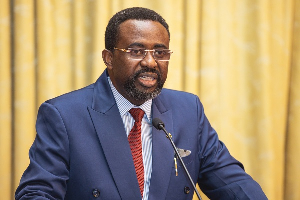Akwasiho (E/R), June 18, GNA - Mr Samuel Asamoah, Kwahu East District Chief Executive, has
advised basic school teachers to use part of their teaching periods to educate school children on the
HIV/ AIDS pandemic and the HINI diseases. He said that would enable school children to have prior knowledge of the diseases and take
precautionary measures to reduce the spread. Mr Asamoah gave the advice when he inaugurated an eight-seater KVIP institutional place of
convenience worth GHC 12,000 for the Presbyterian Primary and Junior High Schools at Akwasiho. He said with education as the government's priority on its better Ghana agenda, a number of
interventions had been put in place to produce well-qualified professionals, for the needed human
resource to drive the economy forward. He noted that the government's promise of free exercise books and school uniforms for basic school
children have been fulfilled, while the school feeding and the capitation grant programmes were being
enhanced to ensure that no child of school going age was denied education, due to the lack of funds by
their parents or guardians. Mr Asamoah said the assembly was constructing three of such institutional places of convenience in
three basic schools in the district, while educational infrastructure such as classroom blocks, offices,
stores and libraries, were being constructed to enhance effective teaching and learning in the schools. The District Director of Education, Mr Baffour Awuah, said the provision of the facility would enhance
effective teaching and learning, since teachers and school children would not leave the classrooms to
attend to nature's call in town, and would also ensure environmental sanitation on the school compound
to avoid communicable diseases. He advised the beneficiary stakeholders such as teachers, the school children, the School
Management Committee (SMC), the Parent- Teacher Association (PTA), to adopt effective maintenance
culture to prolong its lifespan.
Health News of Friday, 18 June 2010
Source: GNA
















